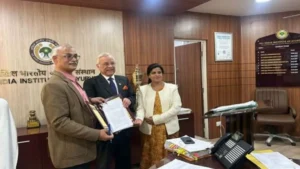In a significant development, India is poised to secure exploration and development rights for five lithium blocks in Argentina, marking its second international foray into critical minerals after a partnership with Australia in 2022. India has taken a crucial step towards reducing its ₹24,000 crore lithium import dependency, primarily sourced from China. The deal finalized between Khanij Bidesh India Ltd. (KABIL) and Catamarca Minera Y Energética Sociedad Del Estado (CAMYEN), an Argentine state-owned mining and energy company.
Exploration and Development Initiatives
Under the agreement, KABIL gains Exploration and Exclusivity Rights for five lithium brine blocks located in Argentina, spanning approximately 15,703 hectares. The specific blocks include Cortadera-I, Cortadera-VII, Cortadera-VIII, Cateo-2022-01810132, and Cortadera-VI. This strategic move empowers the state-owned entity to evaluate, prospect, and explore lithium resources, paving the way for potential discoveries.
Investment and Approvals
The Indian government plans to invest around Rs 200 crore over the next five years for exploration, signaling a strategic commitment to securing a domestic supply of critical minerals. The proposal is awaiting approval from the Cabinet Committee on Economic Affairs.
Offshore Coordination
India is also set to establish an offshore office for KABIL in Catamarca, Argentina, enhancing coordination with provincial regulatory authorities. This move is seen as a proactive measure to ensure effective oversight during the exploration and extraction processes.
Argentina’s Lithium Reserves
Argentina, holding 21% of the world’s lithium reserves concentrated in the Lithium Triangle, is a key partner for India. The salt-lake lithium extraction method employed in Argentina proves economically favorable, contributing significantly to production.
Strategic Importance
This acquisition aligns with India’s pursuit of self-sufficiency in meeting clean energy demands, especially for electric vehicles. The exploration and development agreement is a crucial step towards achieving India’s goal of becoming a manufacturing hub for electric vehicles by 2070.
Global Engagement
KABIL’s active engagement with various countries rich in critical minerals, including Bolivia and Chile, underscores India’s strategic efforts to diversify its sources and reduce reliance on imports, particularly from Hong Kong and China.
Questions Related to Exams
Q: What is the significance of India acquiring five lithium blocks in Argentina?
A: India’s move secures exploration rights, enhancing self-sufficiency in critical minerals for electric vehicles and clean energy goals.
Q: What investment is India making, and what approvals are pending?
A: India plans a Rs 200 crore investment over five years, awaiting approval from the Cabinet Committee on Economic Affairs.
Q: Why establish an offshore office in Argentina, and what does it signify?
A: The offshore office aims to improve coordination with regulatory authorities during lithium exploration, reflecting a proactive oversight measure.
Q: How does Argentina contribute to India’s lithium strategy?
A: Argentina’s salt-lake lithium extraction, cost-effective and productive, aligns with India’s goal to diversify sources and reduce reliance on imports.
Q: What is the broader context of this move for India’s clean energy ambitions?
A: India’s exploration aligns with becoming a global electric vehicle manufacturing hub by 2070, addressing clean energy demands and minimizing lithium import dependence.




 Why the Adani-Marseille Pact Could Be a ...
Why the Adani-Marseille Pact Could Be a ...
 AIIA Signs MoU with General Insurance Co...
AIIA Signs MoU with General Insurance Co...
 Bharat Taxi Partners with AAI to Launch ...
Bharat Taxi Partners with AAI to Launch ...








